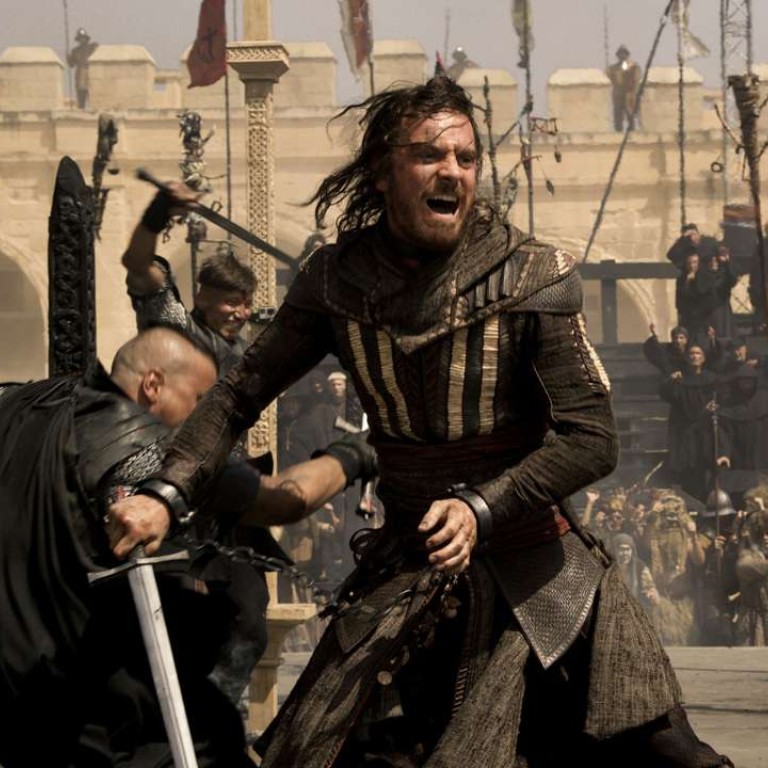
‘I hadn’t played it’: Michael Fassbender picks up Assassin’s Creed’s history on the job of big-screen adaptation
Fassbender, Jeremy Irons and Marion Cotillard star in adaptation of time-travelling stealth killer meets parkour meets sci-fi conspiracy game
Michael Fassbender is not a big video game guy – at least not anymore.
In his younger days, the actor remembers coming home from a night job unloading boxes in a warehouse and playing one particular racing game. “I’d get obsessive about it and sit there for six hours straight,” Fassbender says from Australia, where he is currently shooting the next film in the Alien franchise. “I decided it wasn’t the best thing for me to have around.”
When the French video game developer Ubisoft approached Fassbender a few years ago about signing on to a film adaptation of its popular game series Assassin’s Creed, he knew next to nothing about the game, which blends history, parkour-style action, sci-fi, conspiracy theories and, as the title suggests, a whole lot of killing. “I hadn’t played it,” he says. “I was totally ignorant.”
Suffice it to say, he’s learned a lot since then.
On December 21, 20th Century Fox will release its big-screen take on Assassin’s Creed, with Fassbender starring as Callum Lynch, an alienated, violent drifter who discovers that he is descended from a 15th century Spanish assassin named Aguilar. Recruited (kidnapped is more like it) by a corporation called Abstergo Industries, Lynch taps into his ancestral memories via a device called the Animus to gain the know-how to fight the Assassins’ age-old nemeses the Templars in a battle for the future of humanity.
“Callum doesn’t belong to anything, doesn’t have a family,” Fassbender says of the character, who is different from the original games’ main protagonist, a young bartender named Desmond Miles. “We thought it would be interesting to have somebody that was disconnected be faced with what it means to join something so sacrificial.”
With their rabid built-in fan bases, fast-paced action and often complex mythologies, video games have often been alluring fodder for film adaptations. Assassin’s Creed is one of four hitting cinemas this year, along with Ratchet and Clank, The Angry Birds Movie and Warcraft, and many more are in the pipeline. (Among other projects, Ubisoft’s film division is also developing an adaptation of its Splinter Cell game series, with actor Tom Hardy attached to star.)
Translating the interactive gaming experience into the medium of narrative film, though, is a tricky piece of business. For every commercial success like Lara Croft: Tomb Raider or the Resident Evil series, there are a lot of forgettable duds like Doom and Street Fighter: The Legend of Chun-Li. But Ubisoft and Fox are bullish, and plans are already in the works for an ongoing franchise.
Assassin’s Creed, which jumps in time between the present day and the Spanish Inquisition, is attempting a tricky balancing act – simultaneously treating the game that inspired it with what Fassbender, who is also producing the film, calls “a healthy dose of respect and disrespect.”
On the one hand, the movie is trying to capture what hard-core gamers have loved about the many Assassin’s Creed games, which have sold more than 80 million copies and spawned a number of spin-off comics and novels. On the other, it’s trying to tell an engrossing original story that stands on its own even if you’ve never laid a finger on a game controller. (With Fassbender and co-stars Marion Cotillard and Jeremy Irons, it’s safe to say the Assassin’s Creed cast boasts more Oscar nominations and wins than any previous video game adaptation.)
Like Fassbender, director Justin Kurzel had never played the game before signing on to the project. Nor, for that matter, had the Australian filmmaker – who previously directed Fassbender and Cotillard in last year’s Macbeth – ever made a film on this scale, with this degree of action, special effects and stunt work. “That’s probably what attracted me to it – how frightening it was,” he says.
Rather than try to replicate the first-person gaming experience with gimmickry, Kurzel locked into the characters and the narrative, exploring the idea of genetic memory as well as the rich, volatile history of the Spanish Inquisition.
“I spent most of my time with the story and the real history,” Kurzel says. “That was my main focus – not so much forensically going through every aspect of the game. It was: how do you make this into a piece of cinema?”
If Assassin’s Creed works on those cinematic terms – and, of course, on box-office terms – the plan is to follow it with sequels that will roam through history like the game series, which has ventured into such periods as the Crusades, the Renaissance, the American colonial era and the French Revolution.
“The possibilities are endless,” Kurzel says.
“That’s what’s so intriguing for people who love that universe,” says Fassbender, who adds that a potential Assassin’s Creed trilogy has been sketched out. “I was talking to a friend recently and he said he was talking to his 14-year-old son about going away on a long weekend together. He said, ‘Where do you want to go?’ and his son said, ‘I want to go to Florence.’ He wanted to check out the city because of the game.”
Los Angeles Times

